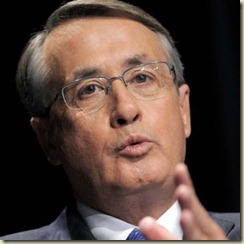Julia Gillard today inched closer to the 76 seat majority required in the House of Representatives to form government. Ms Gillard and the ALP can count on the support of Greens MP Adam Bandt and now independent MP Andrew Wilkie. Is any of this surprising? Not really, the Greens have always supported the ALP. The story is, however, quite different for Mr Wilkie.

Andrew Wilkie, a former member of the Liberal Party (who missed out on pre-selection), former Greens candidate for the seat of Bennelong and now the independent federal member for Denison, Tasmania.
Mr Wilkie grew up supporting the Liberal Party, joining the Young Liberals and subsequently becoming a member for the party. After failing to win pre-selection, he joined the Greens as a candidate for Bennelong, John Howard’s previous seat. He was then nominated as the Green’s second Tasmanian candidate for the Senate before finally running as an independent for the division of Denison in this year’s election. Interestingly, Mr Wilkie only received 21.28% of first preference votes in his favour, relying upon the preferences of his previously beloved Liberal party to get across the line.
It is unclear where Mr Wilkie’s political persuasion lies. He has now officially supported the three major parties in some form over his political career; running as a Liberals and Greens candidates and now supporting an ALP government. His confusion about his true political persuasion can perhaps be seen through his lacklustre commitment to the ALP government. Mr Wilkie signed an agreement with the Gillard government to guarantee supply and to reject any unwarranted no-confidence votes, but stressing that he would consider ALP policies on their merit.
He then proceeded to make the same guarantees to Tony Abbott if the Coalition were to form government.
Mr Wilkie is a confused man. He publically declared that he wanted what was best for his electorate of Denison, but rejected $1 billion of funding to upgrade Royal Hobart Hospital because of his concern that this money would be taken away from other electorates. Surely if his primary concern is that of his electorate, it matters not where or how this $1 billion is found or raised?
On the 7.30 Report, Mr Wilkie also expressed his displeasure at the ‘unethical’ invasion of Iraq, which he described as ‘grossly unethical behaviour’ by the Howard government. Just three days ago he stated that Australian troops should be withdrawn from Afghanistan and the Gillard government’s reasons for non-withdrawal as one of the “great lies of the election campaign”. He then gave his support to a party which supported the Iraq and Afghan wars, despite being apparently displeased with both invasions. He is a confused man, and is unable to stand up for his own beliefs.
This shows that Mr Wilkie is simply desperate to be heard and desperate for power that he is willing to please all parties. May be there was a secret deal allowing Mr Wilkie to gain pre-selection as a Labor candidate in the next election? The more likely (and rational) reason for Mr Wilkie’s support of the ALP appears to be a lingering displeasure with the way he was treated by the Howard government after his whistle-blowing against the Howard governments reasons for going to war in Iraq. I am sure that the people of Denison are questioning their vote for Mr Wilkie (the 21.28% who did vote for him), hopefully they will reconsider their vote if a new election is required.




 Track with co.mments
Track with co.mments
